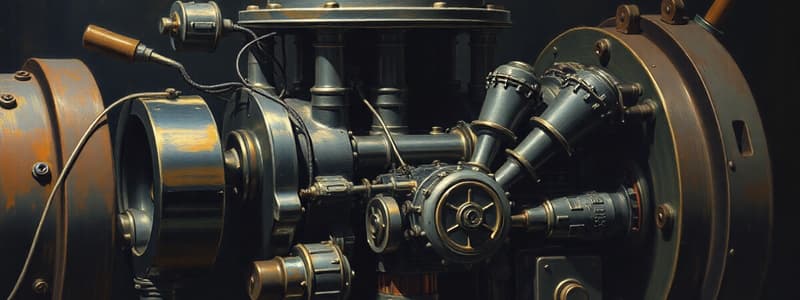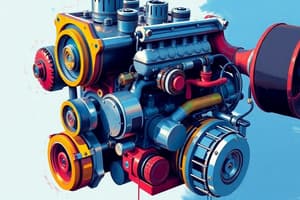Podcast
Questions and Answers
Which system is NOT part of the Internal Combustion Engine systems?
Which system is NOT part of the Internal Combustion Engine systems?
- Cooling System
- Exhaust System
- Fuel System
- Brake System (correct)
What is the primary role of the camshaft in a diesel engine?
What is the primary role of the camshaft in a diesel engine?
Provides the timing needed to properly inject the fuel
What does the governor regulate in a diesel engine?
What does the governor regulate in a diesel engine?
Amount of fuel that the injector is to inject
The Electronic Control Unit (ECU) uses mechanical control to process information.
The Electronic Control Unit (ECU) uses mechanical control to process information.
What are the main objectives of Internal Combustion Engine control?
What are the main objectives of Internal Combustion Engine control?
The injection of liquid fuel into a compressed charge leads to __________.
The injection of liquid fuel into a compressed charge leads to __________.
Which process occurs during the combustion process?
Which process occurs during the combustion process?
What factors affect combustion in diesel engines?
What factors affect combustion in diesel engines?
What is the ignition delay in a diesel engine?
What is the ignition delay in a diesel engine?
The rate of pressure rise in the premixed combustion phase is affected by what?
The rate of pressure rise in the premixed combustion phase is affected by what?
Flashcards are hidden until you start studying
Study Notes
Internal Combustion Engine Systems
- Internal combustion engines (ICE) have several major systems: Air, Fuel, Lubricating, Cooling, Exhaust, Starting, Governing systems.
- Mechanical and Electronic control are used for ICEs.
Mechanical Control of Internal Combustion Engines
- Control is achieved through camshaft, fuel injector, and governor components.
- The camshaft provides timing for fuel injection.
- The fuel injector meters and injects fuel.
- The governor regulates fuel injection volume.
Electronic Control of Internal Combustion Engines
- Uses electronic sensors, actuators or solenoids, and Electronic Control Module (ECM) or Engine Electronic Control Unit (ECU).
- Sensors convert physical inputs to electrical signals.
- Actuators or solenoids convert electrical signals to mechanical movement.
- ECM or ECU processes information from sensors and outputs signals to actuators.
Objectives of ICE Control
- Aims for engine performance, including power, torque, and efficiency.
- Also focuses on economy, such as fuel consumption and tribology.
- Additionally strives for ecological considerations, including emissions (NOx, CO, HC, PM), noise, and smog.
Diesel Combustion Process
- Involves the injection of liquid fuel into a compressed charge (heterogeneous mixture).
- Fuel evaporates and mixes with hot air.
- Auto-ignition occurs due to rapid burning of the fuel/air mixture that is premixed during the ignition delay period.
- Premixed burning is fuel-rich.
- As more fuel is injected, combustion is controlled by the diffusion of air into the flame, creating a turbulent diffusion flame.
Processes Occurring During Combustion Process
- Physical Processes:
- Atomization of fuel
- Vaporization of fuel
- Mixing of fuel vapor with air
- Chemical Processes:
- Pre-combustion reactions
- Cracking of larger hydrocarbons
Factors Affecting Combustion in Diesel Engines
- Fuel properties
- Combustion chamber design
- Degree of swirl and exhaust gas recirculation (EGR)
- Fuel injection pressure
- Rate of injection
- Injection pattern
- Number of injections
- Injection timing
- Speed and load
Combustion Stages of CIE
- Late Combustion Phase: Part of combustion most affected by charge motion.
- Ignition Delay:
- Time between the start of injection and ignition.
- Includes physical ignition delay (depends on fuel type) and chemical ignition delay (longer than physical and strongly influenced by temperature).
- A significant factor in Diesel Knock (caused by injection during ignition delay).
Premixed Combustion Phase
- Main ignition event, often uncontrolled.
- Rate of pressure rise is affected by the delay in fuel atomization, which depends on:
- Injector design
- Combustion chamber design (pre-chambers, swirl chambers)
- Number and spatial arrangement of injector nozzles
- Nozzle hole size
- Spray cone angle
- Injection pressure
- Air density
- Fuel volatility
Studying That Suits You
Use AI to generate personalized quizzes and flashcards to suit your learning preferences.




